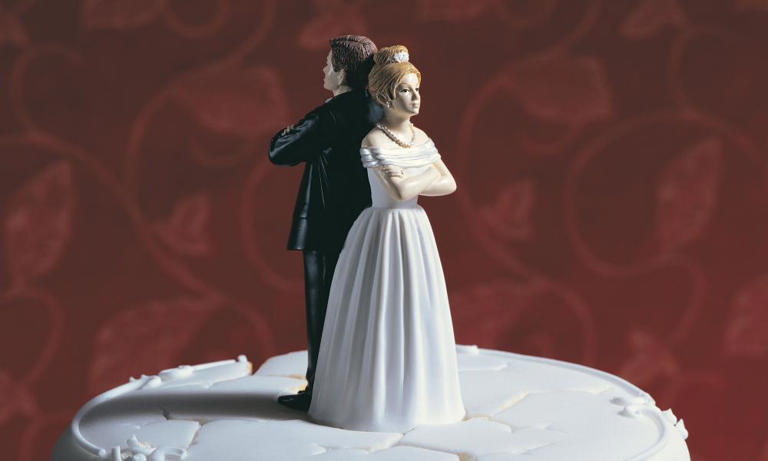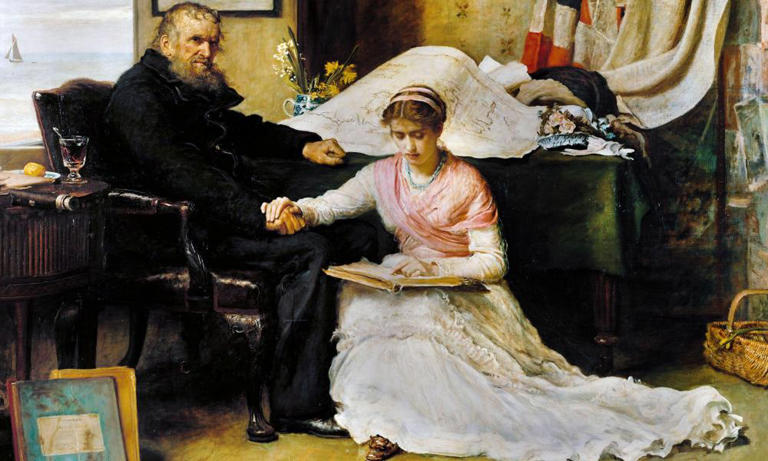
How to spot burnout in your relationship
Delaney: ‘It’s a scenario that often plays out against the backdrop of an exhausting, modern lifestyle’
© Provided by The Telegraph
“Looking back, there were a few years of unhappiness in our marriage before we hit rock bottom,” says Clio Wood, the author of Get Your Mojo Back: Sex, Pleasure and Intimacy After Birth.
“We had been drifting apart and disengaging from each other but neither of us ever addressed it. It got to the stage where I think we forgot about why we ever got together in the first place.”
While some relationships implode amidst high conflict and drama, many more follow the pattern of Wood’s: a slow, almost imperceptible distancing between two people who don’t quite hate each other, might still love each other but have just stopped… liking each other very much.
It’s a scenario that often plays out against the backdrop of an exhausting, modern lifestyle that sees both partners trying to juggle work, parenting, social commitments and money worries alongside what passes for a love life. All too often, it’s their relationship that falls to the bottom of the priority list without them even noticing. Couples counsellors call it “relationship burnout”.
Living together, growing apart
“With very little free time on our hands, we often end up neglecting our relationship because we think it’s the easiest thing to ignore,” says the Relate counsellor Simone Bose. “We worry about our job, our kids, even getting the laundry done. You assume that your partner understands you’re not around to meet their needs. The truth is, you need to take regular time out to nurture your relationship or it can really start to falter. You become like colleagues who are existing in the same space but living separate lives.”
“I speak to couples who have found that they increasingly live separate lives while still together,” she says. “It is easier than talking things through or splitting up. And so they might live together but just do their own thing, rarely engaging in any meaningful way. It can be extremely lonely for both parties.” The situation worsens when we start to simply accept the distance between us, she says. “Often people tell me that they don’t want to come across as needy or vulnerable and so they decide to cope by becoming ultra-independent. But these things have to be worked through together.”
Fullscreen button
Counsellor Simon Bose says that couples ‘need to take regular time out to nurture [their] relationship or it can really start to falter’ – Moment RF
Counsellor Simon Bose says that couples ‘need to take regular time out to nurture [their] relationship or it can really start to falter’ – Moment RF
© Provided by The Telegraph
Jimmy, a 34-year-old producer from Manchester, describes the decline of his four-year relationship, which ended in 2023, as wholly undramatic. “We bickered but there were no massive rows,” he says. “We just started being more and more irritable with each other. We were rarely having sex. Holidays and weekends started to seem less like fun and more like a chore or obligation. We cared about each other but it had become like a loving friendship. We both had busy lives and had let them overtake the importance of the relationship.”
The psychotherapist Noel McDermott says that external factors are the most common factors in relationship burnout. “Couples become distracted and unhappy because their lives are so busy and intense,” he explains. “But rather than make changes to their lifestyles they start to think that the relationship must have fundamental problems or that they’re simply not compatible. It doesn’t help that social media has created unrealistically perfect ideas of what it’s like to be in a relationship. If you’re not living up to the romantic ideal you might be quick to think the relationship is not worth fighting for.”
Wood was in her mid-30s and had been married to her husband Bryn (with whom she has a three-year-old daughter) for six years when she noticed their relationship was suffering. “It was little things at first – like we would barely greet each other when we came home,” she says. “I started to find myself more irritated than excited by his presence. But my main feeling was numbness. There were no big arguments. It was just all quite unenjoyable.”
Throwing the baby out with the bathwater
Many couples in middle age make light of how dull their relationships have become, says Wood. “I noticed that we and our friends would make gags like ‘Of course we don’t have sex any more, we have kids!’ That normalises it. But, as I found out, that situation can become quite serious and threaten the future of the marriage.”
The key, says Bose, is identifying these little problems and talking about them honestly with each other. “It’s easy to laugh about how much your partner annoys you,” she says. “But you should be talking to your partner honestly about what your emotional needs are and asking them what they require from you. Little problems become big ones unless you find the time to communicate about them regularly.”
There is a tendency among many couples to simply “throw the baby out with the bathwater” when they start to experience burnout. “It’s natural to get annoyed with your partner or for your passion towards them to have ups and downs,” notes McDermott.
“But rather than decide that the relationship is doomed, it’s helpful to try and be accepting of their flaws and of your own feelings. Realise that these are the natural bumps in the roads and do practical things to address them.” He suggests working on the ‘emotional tone’ of your relationship. “Don’t finger point or blame each other – just explain your feelings and ask your partner to do the same” and work on healthy ways of dealing with conflict. “Accept your partner’s imperfections,” he says. “Suggest small changes to their behaviour, not wholesale changes to their personality.”
When to take action
Jimmy’s relationship ended when both he and his partner both admitted that they had not been happy for over six months. “I wish we had been brave enough to admit the way we felt sooner,” he says. “The spark had gone but rather than confront that and try to find solutions we avoided the conversation because we just didn’t want to hurt each other’s feelings. We still cared about each other. I don’t regret the break-up but I do wish we had at least tried to communicate our feelings sooner. At least we wouldn’t have wasted all those months feeling unhappy.”
Burnout leaves us in a state of exhaustion where the last thing most of us want to do is enter into complex and challenging conversations. And so many of us keep our heads down, ignoring the problem and hoping it might just get better in time. It rarely does.
So how do couples take the plunge and actually address burnout? “The first step is awareness of the problem,” says Bose. “Accept that the relationship needs more attention and that you deserve to have your needs met. Then vocalise these feelings to your partner in a soft way, without blame. Own your feelings and use positive phrases such as: ‘I feel lonely, I want to feel closer to you and feel like we did at the start of our relationship. How do you feel? Is there anything you need from me?’”
Sometimes, the things that need changing are outside the relationship itself. “I think couples need to be willing to change the fundamentals of their lives a little bit,” says Bose. “If the relationship has slipped to the bottom of your priority list, it’s no wonder you’re having problems. So you need to find a way of making more space – whether that be dedicated time away from work or digital devices, arranging childcare so you can have time alone or even skipping the laundry or other chores once in a while. I advise clients to try and carve out 15 minutes in a week just to spend time together. If that’s not possible, try five minutes at least. If you don’t feel five minutes is possible then maybe you’re not serious enough about fixing things.”
For Wood, it took hitting a rock-bottom moment to realise her marriage was worth saving. “In 2019, we were starting to think of divorce after a few years of unhappiness,” she says. “But then I had an ectopic pregnancy, which was extremely traumatic, I had to lean on my husband for emotional support. He was really there for me and I started to realise how important our relationship was. We went to couples therapy which helped because it’s a space in which everyone is equal: none of the problems are framed as anyone’s “fault”, and we can just talk things through constructively.”
They rebuilt their relationship and, two years ago, had a second daughter. “I’m so glad we realised it was worth fighting for,” says Wood. “We still go to couples therapy from time to time now. The most important thing we have learned is that ups and downs are natural in a relationship but it’s best to tackle them as soon as they arise rather than let them build up to burnout level.”
Four signs that you could be experiencing relationship burnout
You’re irritable
“I reached a stage where I found everything my husband said really annoying,” says Wood. But exhaustion can drastically lower our annoyance threshold, Bose adds. “When we’re overwhelmed by life, we can snap quickly at those we’re closest to. Ask yourself if you can still see the good in your partner? If you can, perhaps you need to change your lifestyle so you can be more patient with them.”
You’re avoidant
“Ask yourself if you are behaving in a way that helps you avoid asking for your needs to be met,” says Bose. “You might just be throwing yourself into distractions like work or digital devices or your social life, instead of telling your partner that you feel lonely and unloved.”
You’re not physical
“Can you still share the little romantic moments that you did at the start of your relationship?” says Bose. “If you can’t just hug and look into each other’s eyes without it feeling awkward or uncomfortable, then you might have let the flame burn out. It can be revived but it starts with talking about it.”
You compare your relationship to perfect ideals
“There is a strong tendency to expect too much of our relationships these days,” says McDermott. “Social media and the wellness industry has taught us to expect perfection that, in reality, is impossible. Relationships are messy but when you are burnt-out you might not feel up to coping with those difficult times. Usually, the problem is nothing to do with you, your partner or the relationship itself. It’s to do with the exhausting nature of the lifestyles you’re living.”
Story by Sam Delaney: The Telegraph:


